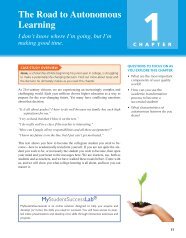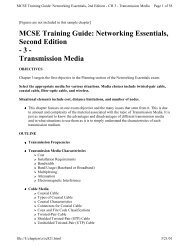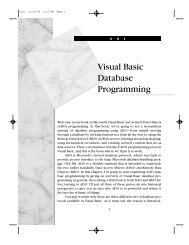SOCIAL PROBLEMS: A Down-to-Earth Approach, 8/e
SOCIAL PROBLEMS: A Down-to-Earth Approach, 8/e
SOCIAL PROBLEMS: A Down-to-Earth Approach, 8/e
Create successful ePaper yourself
Turn your PDF publications into a flip-book with our unique Google optimized e-Paper software.
and abortion as murder. In almost a mirror image, the proabortion groups want Congress<br />
<strong>to</strong> pass a Freedom of Choice Act that would remove all state restrictions on abortion.<br />
The activists in this ongoing social problem illustrate how interest groups develop<br />
alternative strategies as they line up on opposing sides of a social issue. In the case of abortion,<br />
the final results are still unclear—and perhaps they never will be final. On both sides<br />
are highly motivated people. Each side considers the other unreasonable. Each is rationally<br />
and emotionally dedicated <strong>to</strong> its view of morality: One talks about killing babies,<br />
the other about forcing women <strong>to</strong> bear unwanted children, even those conceived from<br />
incest and rape. With no middle ground <strong>to</strong> bridge the chasm, there is no end in sight <strong>to</strong><br />
this bitter, determined struggle.<br />
The Role of Sociology in Social Problems<br />
Sociology as a Tool for Breaking Through Emotions and Defenses<br />
One of the primary characteristics of humans is that we think of our world in personal<br />
and moral terms. In the chapter’s opening vignette, for example, Lisa may think that<br />
her grandmother is narrow-minded, and her grandmother may wonder how Lisa acquired<br />
such casual morals. We all put up defenses <strong>to</strong> protect our self-concept, and most of us are<br />
convinced that our views—and what we feel and what we do—are right, that it is others<br />
who are wrong. Obviously, such self-protective attitudes and defenses are major obstacles<br />
when it comes <strong>to</strong> understanding social problems. Let’s see how sociology can help.<br />
FIVE CONTRIBUTIONS OF SOCIOLOGY TO UNDERSTANDING <strong>SOCIAL</strong> <strong>PROBLEMS</strong>. Sociology,<br />
the study of social behavior, helps us <strong>to</strong> see past the passions that surround a social problem.<br />
There are five ways by which sociology can penetrate such emotions and defenses <strong>to</strong> yield<br />
a better understanding of social problems.<br />
1. Sociologists can measure objective conditions. For abortion, sociologists can gather information<br />
on the number of abortions performed in clinics and hospitals and on how<br />
the states vary in their access <strong>to</strong> abortions. They can also determine why women have<br />
or do not have abortions, how women adjust <strong>to</strong> their decision <strong>to</strong> abort or <strong>to</strong> bear a<br />
child, and how their husbands or boyfriends react.<br />
2. Sociologists can measure subjective concerns; that is, they can determine people’s attitudes<br />
and views about social problems (Becker 1966). Such information is useful in<br />
evaluating potential policies. To establish sound public policy involves much more<br />
than measuring public opinion, of course, but accurate measurements can guide<br />
policy makers. Table 1-3, which summarizes Americans’ attitudes about the legality<br />
of abortion, provides an example of how sociologists measure subjective concerns.<br />
Note how people’s attitudes are related <strong>to</strong> their gender, race-ethnicity, age, education,<br />
income, politics, and place of residence.<br />
3. Sociologists can apply the sociological imagination; that is, they can place social problems<br />
in<strong>to</strong> their broad social context. For example, abortion is related <strong>to</strong> people’s attitudes<br />
about sexuality and sex roles. Abortion is also related <strong>to</strong> profound differences<br />
of opinion about privacy, what human life is, when life begins and ends, the role of<br />
the medical profession in terminating life, and the role of religious institutions in a<br />
pluralistic society. It is also related <strong>to</strong> ideas about individual freedom versus responsibility<br />
<strong>to</strong> the group, desirable standards of living and parenting, and what is and is<br />
not moral (Lerner et al. 1990).<br />
4. Sociologists can identify different ways <strong>to</strong> intervene in a social problem. They can suggest<br />
potential social policies: courses of action for public and private agencies, educational<br />
programs, public awareness campaigns, and legal changes <strong>to</strong> address a social problem.<br />
5. Sociologists can evaluate likely consequences of social policies (Becker 1966). For example,<br />
sociologists can estimate how a proposed social policy on abortion will affect the<br />
birth rate, population growth, crime rate, and expenditures for welfare and education.<br />
14 CHAPTER 1 HOW SOCIOLOGISTS VIEW <strong>SOCIAL</strong> <strong>PROBLEMS</strong>: THE ABORTION DILEMMA
















